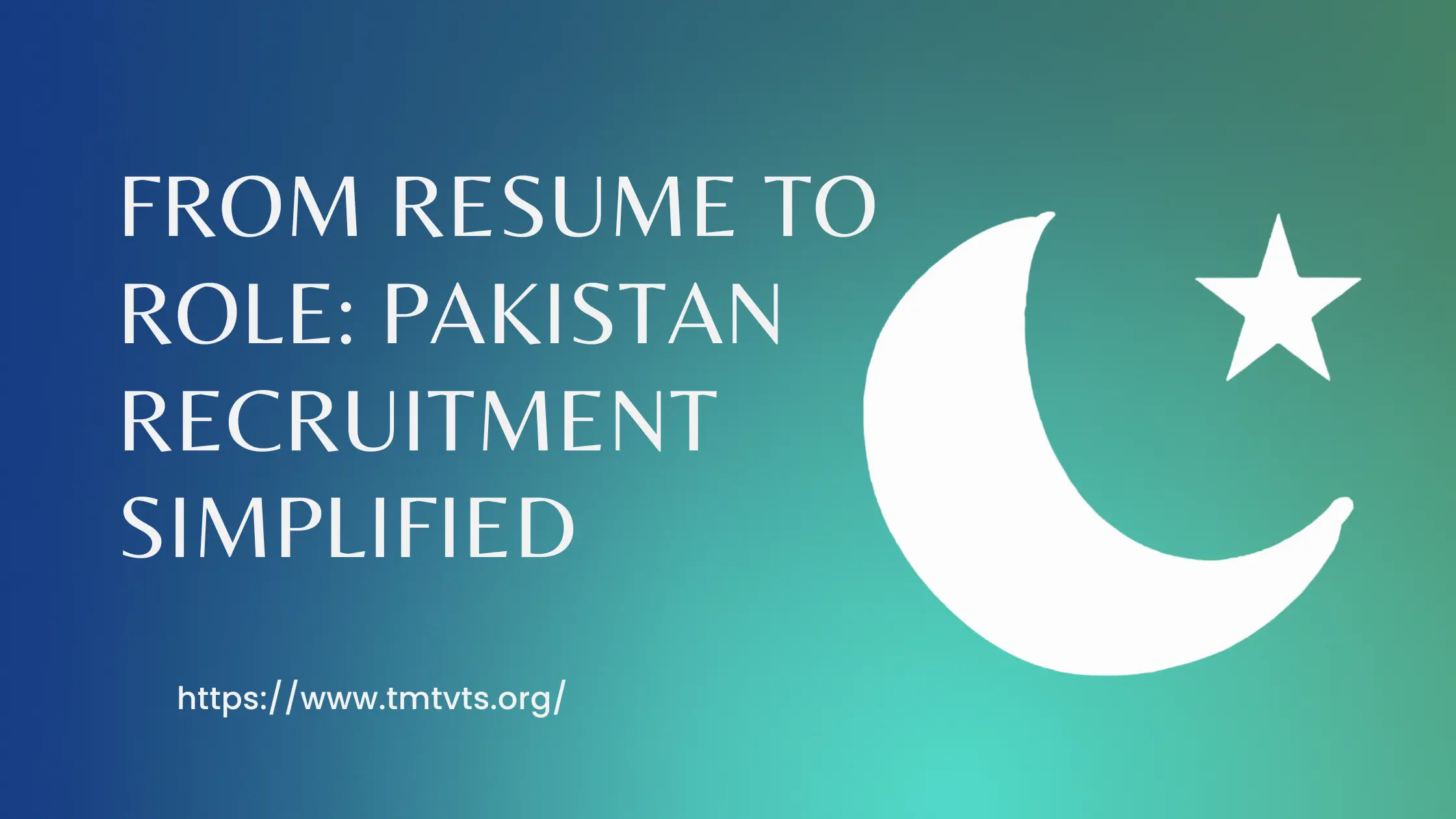The Pakistani job market has evolved dramatically over the past decade. With a growing tech sector, expanding services industry, and increasing foreign investment, opportunities abound for skilled professionals. Yet, navigating the recruitment process can still feel overwhelming for many job seekers. Whether you’re a fresh graduate from a Pakistani university or an experienced professional looking to make your next career move, understanding the recruitment landscape is crucial for success.
The Modern Pakistani Job Market Landscape
Pakistan’s economy is experiencing significant transformation. The IT sector alone contributes over $2 billion annually to the economy, while traditional industries like textiles, manufacturing, and agriculture continue to provide substantial employment. Cities like Karachi, Lahore, and Islamabad have become hubs for multinational corporations, local startups, and everything in between.
This diversity means recruitment practices vary significantly across industries and regions. A software developer in Islamabad might experience a completely different hiring process than a marketing manager in Karachi or a textile engineer in Faisalabad. Understanding these nuances is the first step toward recruitment success.
Crafting Your Resume for the Pakistani Market
Your resume is your first impression, and in Pakistan’s competitive job market, it needs to stand out while respecting local expectations and cultural norms.
Essential Elements
Start with clear contact information, including your mobile number, professional email address, and city of residence. Many Pakistani employers still prefer phone calls for initial contact, so ensure your number is always reachable. Include your LinkedIn profile if you have one – professional networking is increasingly important in urban markets.
Your professional summary should be concise yet compelling. Rather than generic statements, focus on specific achievements and skills relevant to your target role. For example, instead of “experienced marketing professional,” write “Marketing specialist with 3 years driving 40% growth in digital campaigns for FMCG brands in Punjab market.”
Tailoring for Local Preferences
Pakistani employers often appreciate candidates who demonstrate cultural awareness and local market understanding. If you’ve worked on projects serving Pakistani customers or understand regional preferences, highlight this experience. For instance, if you’re in retail, mention your understanding of shopping patterns during Ramadan or Eid seasons.
Education credentials carry significant weight in Pakistan, so list your degrees prominently. Include your institution’s name, degree type, and graduation year. If you graduated with honors or distinctions, mention them. Many employers still value candidates from well-known Pakistani universities like LUMS, IBA, or NUST.
Language skills are particularly valuable. Fluency in Urdu and English is often expected, but proficiency in regional languages like Punjabi, Sindhi, or Pashto can be advantageous depending on your target market and role.
Common Mistakes to Avoid
Avoid overly creative resume formats unless you’re applying for design roles. Most Pakistani employers prefer clean, professional layouts that are easy to scan. Keep your resume to 1-2 pages unless you’re in academia or have extensive senior-level experience.
Don’t include personal information like marital status, religion, or family details unless specifically requested. While some traditional employers might expect this information, modern companies focus purely on professional qualifications.
Understanding the Application Process
The application process in Pakistan varies significantly between organizations, but certain patterns have emerged across different sectors.
Online Applications
Most modern companies use online application systems. Popular job portals like Rozee.pk, BrightSpyre, and LinkedIn are widely used by both employers and job seekers. When applying through these platforms, ensure your profile is complete and regularly updated. Many recruiters search these databases directly, so an optimized profile can lead to unsolicited opportunities.
For tech roles, platforms like AngelList for startups or direct company websites are increasingly common. International companies operating in Pakistan often use global platforms like Workday or SuccessFactors for their hiring processes.
Traditional Channels
Despite digital transformation, traditional recruitment methods remain important in Pakistan. Referrals through professional networks, family connections, or university alumni are still highly effective. Don’t underestimate the power of personal recommendations – they often carry more weight than cold applications.
Print media, particularly English and Urdu newspapers, still feature job advertisements, especially for government positions and established corporations. The Sunday editions of Dawn, The News, and Express Tribune typically have dedicated career sections.
Direct Outreach
For senior positions or niche roles, direct outreach to companies can be effective. Research companies you’d like to work for and reach out to their HR departments or relevant hiring managers through LinkedIn or email. This approach works particularly well for startups and smaller companies that might not have formal recruitment processes.
The Interview Process Decoded
Pakistani interview processes typically involve multiple stages, each designed to assess different aspects of your candidacy.
Initial Screening
Most companies start with a phone or video screening. This initial conversation usually covers basic qualifications, salary expectations, and availability. Be prepared to discuss your resume in detail and explain any gaps in employment or frequent job changes.
For many roles, especially in customer service or sales, English communication skills are assessed during this stage. Practice speaking clearly and confidently about your experience and career goals.
Technical Assessments
Depending on your field, you might face technical tests or assignments. Software developers often complete coding challenges, while marketing candidates might develop campaign proposals. These assessments are usually conducted online and can take several hours to complete.
Prepare by reviewing fundamental concepts in your field and practicing relevant skills. For technical roles, websites like HackerRank or LeetCode can help you prepare for coding challenges. For business roles, review case study frameworks and practice presenting solutions clearly.
Face-to-Face Interviews
In-person interviews remain the norm for most Pakistani companies, though video interviews have become more acceptable post-pandemic. These sessions typically last 45-90 minutes and involve meeting with multiple stakeholders, including your potential manager, HR representatives, and sometimes senior executives.
Dress conservatively and professionally. For men, a business suit or dress shirt with formal trousers is standard. Women should opt for professional attire that’s culturally appropriate – pantsuits, formal shalwar kameez, or conservative dresses work well in most corporate environments.
Cultural Considerations
Pakistani business culture values respect, punctuality, and relationship-building. Arrive early for interviews, greet everyone politely, and be prepared for some small talk before diving into formal questions. It’s common for interviewers to ask about your family background or interests as a way to build rapport.
Show genuine interest in the company and role by asking thoughtful questions about growth opportunities, company culture, and industry challenges. This demonstrates your commitment and long-term thinking.
Salary Negotiations and Expectations
Compensation discussions in Pakistan require cultural sensitivity and market awareness.
Market Research
Before any negotiation, research salary ranges for your role and experience level. Websites like PayScale, Glassdoor, and local salary surveys can provide benchmarks. Consider factors like company size, industry, and location when setting expectations.
Keep in mind that salary structures in Pakistan often include additional benefits like medical insurance, transport allowances, annual bonuses, and religious holiday bonuses (Eid bonuses are common). These perks can significantly impact your total compensation package.
Negotiation Strategies
Pakistani business culture generally involves some degree of negotiation, but approach it respectfully. Rather than making demands, frame discussions around mutual benefit. For example, “Based on my research and the value I can bring to this role, I was hoping we could discuss a salary range of X to Y.”
Be prepared to justify your expectations with concrete examples of your achievements and market research. If the company cannot meet your salary requirements, explore other forms of compensation like flexible working arrangements, additional leave days, or professional development opportunities.
Beyond Base Salary
Consider the complete package when evaluating offers. Many Pakistani companies provide substantial benefits that might not be immediately apparent. These can include:
- Comprehensive health insurance for you and your family
- Annual performance bonuses
- Religious and cultural holiday bonuses
- Transportation allowances or company vehicles
- Housing allowances for senior positions
- Professional development budgets
- Flexible working arrangements
Building Your Professional Network
Networking plays a crucial role in career advancement in Pakistan, often more so than in Western markets.
Professional Associations
Join industry-specific associations relevant to your field. Organizations like the Pakistan Software Houses Association (P@SHA) for tech professionals, the Institute of Chartered Accountants of Pakistan (ICAP) for finance professionals, or the Pakistan Medical Association for healthcare workers provide excellent networking opportunities.
These associations often host conferences, workshops, and networking events where you can meet industry leaders and learn about job opportunities before they’re publicly advertised.
Alumni Networks
Pakistani universities typically have strong alumni networks, both locally and internationally. Stay connected with your alma mater through alumni associations and events. Many successful professionals actively help fellow graduates find opportunities.
LinkedIn has made it easier to connect with alumni working in your target companies or industries. Don’t hesitate to reach out to alumni for informational interviews or advice about their career paths.
Industry Events and Conferences
Major cities host numerous professional events throughout the year. Tech conferences like DevFest, marketing summits, and industry-specific trade shows provide opportunities to meet potential employers and stay updated on industry trends.
Many of these events offer student discounts or volunteer opportunities if budget is a concern. The relationships you build at these events often prove more valuable than the sessions themselves.
Leveraging Technology and Digital Platforms
The Pakistani job market has embraced digital transformation, creating new opportunities for job seekers who understand how to leverage technology effectively.
Social Media Presence
A professional online presence is increasingly important, especially for roles in marketing, sales, or client-facing positions. LinkedIn is essential for professional networking, but don’t overlook other platforms relevant to your industry.
For creative roles, Instagram or Behance portfolios can showcase your work. Tech professionals benefit from active GitHub profiles or technical blogs. Whatever platform you choose, ensure your content is professional and aligned with your career goals.
Online Learning and Certifications
Pakistani employers increasingly value continuous learning and professional development. Platforms like Coursera, Udemy, and edX offer courses from international universities that can enhance your skills and demonstrate commitment to growth.
Google, Facebook, and other tech giants offer free certification programs that are well-recognized by Pakistani employers. Industry-specific certifications like PMP for project management or various IT certifications can significantly boost your employability.
Remote Work Opportunities
The pandemic has normalized remote work in Pakistan, opening up opportunities with international companies. Freelancing platforms like Upwork, Fiverr, and Toptal have helped many Pakistani professionals build global careers while staying in the country.
This trend has also led to more flexible work arrangements with local companies, allowing for better work-life balance and access to opportunities regardless of geographic location.
Overcoming Common Challenges
Job seekers in Pakistan face unique challenges that require specific strategies to overcome.
Competition and Market Saturation
With a large population of educated professionals, competition for quality jobs can be intense. Differentiate yourself by developing niche skills, gaining relevant certifications, or building a strong portfolio of achievements.
Consider targeting emerging industries or roles that are growing faster than traditional sectors. Fields like digital marketing, data analysis, and e-commerce offer significant opportunities for growth-minded professionals.
Skills Gap
Many Pakistani graduates face a skills gap between academic learning and industry requirements. Bridge this gap through internships, freelance projects, volunteer work, or personal projects that demonstrate practical application of your skills.
If you’re a recent graduate, consider starting with smaller companies or startups where you can gain diverse experience and grow quickly. These environments often provide more hands-on learning opportunities than large corporations.
Economic Uncertainty
Pakistan’s economy can be volatile, affecting job security and growth opportunities. Build resilience by developing multiple income streams, maintaining an emergency fund, and continuously updating your skills to remain marketable regardless of economic conditions.
Consider industries that are less susceptible to economic downturns, such as healthcare, education technology, or essential services. These sectors often provide more stable career paths.
Future-Proofing Your Career
The Pakistani job market continues to evolve, influenced by global trends and local developments.
Emerging Opportunities
Pakistan’s digital economy is expanding rapidly, creating new roles in fintech, e-commerce, and digital services. The government’s focus on IT exports and digital transformation presents opportunities for tech-savvy professionals across all industries.
Green energy initiatives and environmental consciousness are creating opportunities in renewable energy, sustainable manufacturing, and environmental consulting. Similarly, Pakistan’s growing middle class is driving demand for consumer services, retail, and entertainment industries.
Continuous Learning
Stay ahead by continuously updating your skills and knowledge. Follow industry publications, attend webinars, and participate in professional development programs. The most successful professionals treat learning as a lifelong journey rather than something that ends with formal education.
Consider developing skills that complement your primary expertise. For example, data analysis skills are valuable across all industries, while digital marketing knowledge can enhance careers in various fields.
Conclusion
The journey from resume to role in Pakistan’s job market requires patience, strategy, and cultural understanding. Success comes from combining professional competence with relationship-building, leveraging both traditional networks and modern digital platforms.
Remember that career development is a marathon, not a sprint. Focus on building long-term relationships, continuously improving your skills, and staying adaptable to changing market conditions. With the right approach and persistence, Pakistan’s growing economy offers tremendous opportunities for motivated professionals.
The key is to remain authentic to your values while being flexible in your methods. Whether you’re just starting your career or looking to make a significant change, the principles outlined here can help you navigate Pakistan’s dynamic job market successfully.
Your career is ultimately a reflection of the value you create for others. Focus on developing skills that solve real problems, build meaningful professional relationships, and stay committed to continuous improvement. Success in Pakistan’s job market, as anywhere else, comes to those who prepare thoroughly, persist through challenges, and remain open to opportunities as they arise.





